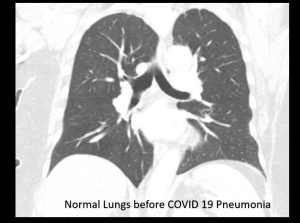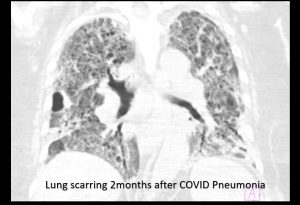Most people who have had COVID-19 recover completely within a few weeks, however, some people, even those with mild versions of the disease continue to experience symptoms long after their initial recovery.
These people are sometimes referred to as “long haulers” and the conditions have been called post-COVID-19 syndrome or “long COVID-19.”
Post COVID-19 conditions have been seen in those who were hospitalized with COVID-19 and patients with very mild symptoms.
UConn Health began seeing patients in the Long-COVID Recovery Center to help patients dealing with their post-COVID symptoms. Dr. Ameer Rasheed, pulmonologist at UConn Health sees patients at this center. Patients are referred by their primary care physicians at UConn Health after experiencing persistent symptoms beyond eight weeks.
The Long COVID Recovery Center provides a centralized, comprehensive approach to address patients’ wide array of symptoms.
The most common long COVID symptoms include:
- Cough
- Fatigue
- Body aches
- Joint pain
- Shortness of breath
- Difficulty sleeping
- Headaches
- Brain fog
The majority of patients who develop COVID-19 infection are expected to recover within 4-8 weeks, however, those that go beyond eight weeks should see their primary care physician, who can refer them to the Long-COVID Recovery Center,” says Rasheed.

COVID-19 can attack the body in a range of ways, causing damage to the lungs, heart, nervous system, kidneys, liver, and other organs as well as mental health problems.
Patients in the Long-COVID Recovery Center get a comprehensive evaluation by Rasheed who then coordinates the care with the patient to the appropriate specialists if needed.
Patients with long COVID experience a spectrum of symptoms including respiratory, neurological, and mental health. Rasheed cares for patients with ongoing respiratory symptoms. Patients with neurological symptoms are referred to Dr. Jaime Imitola, Director Division of Multiple Sclerosis and Neuroimmunology at UConn Health, and those with ongoing mental health issues are referred to Dr. Kristina Zdanys, Associate Professor of Psychiatry at UConn Health where patients are seen in two weeks.

“Patients are most comforted to know that they are not alone, there are others who are going through the same issues post-COVID,” says Rasheed.
COVID-19 can have long-term effects on the airways, lung capacity, and the ability to exchange oxygen and carbon dioxide, producing respiratory issues from scarring and other permanent problems in the lungs such as lung fibrosis to asthma and persistent shortness of breath.
Lung recovery after COVID-19 is possible but takes time. Breathing exercises and respiratory therapy can help as well as a physical exercise program that Rasheed recommends when appropriate.
Some individuals develop neurological symptoms following COVID infection, including brain fog, fatigue, headaches, and dizziness. The cause of these symptoms is unclear but is an active area of investigation. Patients with these issues are referred to neurology for care.
After surviving COVID-19, some people are left with lingering anxiety, depression, and other mental health issues. Physical changes such as pain and weakness can be complicated by long periods of isolation, stress from job loss and financial difficulties, and grief from the deaths of loved ones, and the loss of good health. Receiving mental health care is important for these symptoms as well.
The best way to avoid post-COVID-19 complications is to prevent infection with the coronavirus in the first place. Practicing coronavirus precautions and getting a COVID-19 vaccine are effective ways to avoid getting COVID-19.
The Long-COVID Recovery Center is currently open to UConn Health patients experiencing persistent symptoms beyond eight weeks. Contact your primary care physician via phone or MyChart messaging to obtain a referral to the Center.



